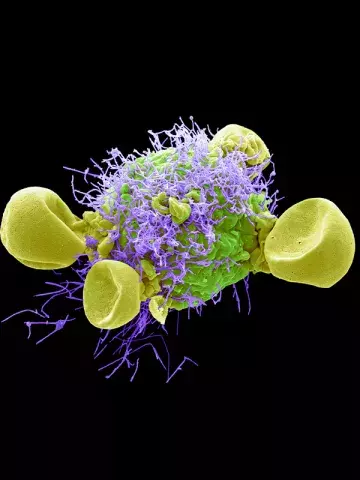Nirsevimab protects infants from RSV-associated hospitalisation
By Rebecca Jenkins
One dose of the monoclonal antibody nirsevimab protects infants from hospitalisation with lower respiratory tract infections (LRTIs) associated with respiratory syncytial virus (RSV), a large study finds.
In the ongoing 3b, multicentre, open-label HARMONIE trial, researchers enrolled more than 8000 healthy infants who were 12 months of age or younger, had been born at gestational age of 29 weeks or more and were entering their first RSV season.
Researchers found 11 of the 4027 infants (0.3%) randomised to receive a single intramuscular injection of nirsevimab were hospitalised for RSV-associated LRTIs compared with 60 of the 4021 infants (1.5%) in the standard care group. This corresponded to an 83.2% efficacy for nirsevimab during the 2022 to 2023 RSV season, they reported in The New England Journal of Medicine.
Very severe RSV-associated LRTIs occurred in five infants (0.1%) in the nirsevimab group and in 19 (0.5%) of the standard care group, equating to an efficacy of 75.7% for nirsevimab.
The therapy’s efficacy was consistent in the three participating countries (France, Germany and the UK), the researchers noted, adding the industry-sponsored trial was conducted under conditions as similar as possible to real-world settings.
Nirsevimab was approved by the TGA last year for the prevention of RSV in neonates, infants, and vulnerable children aged up to 24 months.
Professor Margie Danchin, Consultant Paediatrician and Leader of the Vaccine Uptake Group at the Murdoch Children’s Research Institute (MCRI) in Melbourne, welcomed the findings, noting that for more than 50 years there had been limited options to prevent RSV disease.
‘Most therapeutics have been largely ineffective or limited to high-risk infants as with the current RSV prophylaxis,’ she said.
She noted that in Australia, the monoclonal antibody palivizumab, which is given monthly in hospital during the RSV season, was the only available preventative medicine for infants, but due to cost was only administered to the highest-risk infants.
‘The HARMONIE trial included both healthy preterm and term infants, to more accurately reflect real world conditions,’ shesaid. ‘As such, nirsevimab has the potential to substantially reduce the burden of disease and healthcare costs for all infants entering their first season of RSV.’
RSV vaccines are also becoming available, with the TGA last month approving Arexvy for adults aged 60 years and older.
Professor Danchin said a different RSV vaccine, Abrysvo for use in older adults, had also shown promising results in a phase 3 trial when given to pregnant women to prevent RSV disease in their offspring. It has been approved for use in the US but not yet in Australia.
‘We should soon have two excellent options with nirsevimab for infants post-delivery and a maternal RSV vaccine,’ Professor Danchin said. ‘Countries are now starting to grapple with how the two options will work together and be implemented taking into account supply, effectiveness, safety, cost, equity and acceptability in particular.’
The MCRI is currently enrolling participants in its RSVChoice Study, which is a national discrete choice experiment survey aiming to understand how pregnant women and mothers of infants under 2 years of age will make these decisions and what key attributes will inform their decision making.


